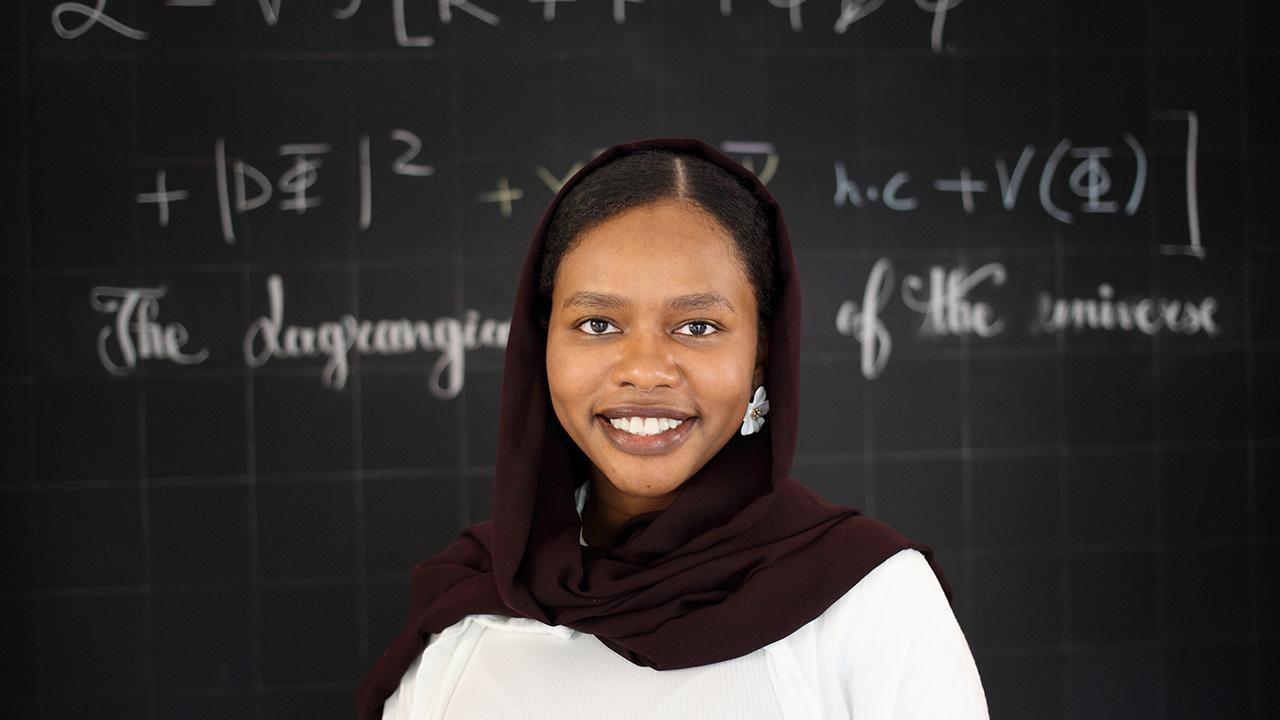
Solafa Fadlallah’s studies have brought her to three different countries, four if you include Italy. She obtained a bachelor’s in chemical engineering at the University of Khartoum, in Sudan, a master’s in financial mathematics at the University of Aberdeen, in Scotland, and a master’s in machine intelligence at the African Institute for Mathematical Sciences in Senegal. Throughout all of these degrees, however, she had one goal: “I need to go deeper. I need to understand the foundations behind all of these amazing things.”
From the very start, she was drawn to the physics that underlies engineering, the deep principles that make it possible to build the products and technologies that we use every day. Over time, however, her curiosity shifted towards the more theoretical side of science. “To be a successful engineer,” she points out, “you really need to understand the physics and maths behind it.” This led her to Aberdeen, where she met Jarosław Kędra, a professor of maths there who visited ICTP in 2001. After she was accepted to ICTP’s Postgraduate Diploma Programme, he congratulated her. “He told me he had been to this lovely place long ago,” she recalls, “and that he is glad that I am at ICTP”. She had realized it was the right place even before she applied: “I was checking the ICTP website and I saw the announcement for the programme. It wasn’t just maths or physics, it was about more, and it was exactly what I wanted.”
In her final project, she is applying techniques and insights from statistical mechanics to Artificial Intelligence, under the supervision of ICTP Research Scientist Jean Barbier. “This project is really fascinating, because I never expected that we could apply ideas from statistical mechanics to better understand Machine Learning,” she explains. “For example, I am working on investigating which statistical distributions are harder or easier for the student to learn, in a teacher-student setting.”
This work is the ideal conclusion of her experience in the Diploma programme, which was deeply transformative. “The programme is intense, but also incredibly rewarding. I am not the same Solafa that I was when I first entered here, both in terms of intellectual and personal growth,” she said. During her time as a Diploma student of the Quantitative Life Sciences section, she learned a variety of new topics, like biophysics, ecology, neuroscience and complex systems. Her previous studies had already provided her with background knowledge on Machine Learning and neural networks, which she could deepen while at ICTP. But she also learned from her peers: “You never see a problem from just one point of view,” she says. “You always have students with different backgrounds and people from different countries. Whenever we had an assignment or a project, it was always really nice to see how different people had different approaches and perspectives.”
Starting in the fall, Fadlallah will be a PhD student at the University of Trieste, working on leveraging hybrid AI-maths models for the management of pandemics and epidemics. “I am really happy, and I cannot wait to start the PhD journey.” In the long term, she plans to go back to Sudan: “I am already part of the academic staff of the faculty of Engineering at the University of Khartoum,” she explains, “During the Diploma I was carrying out my duties online, and I definitely plan to resume my academic career there once I am done with my PhD.”
















